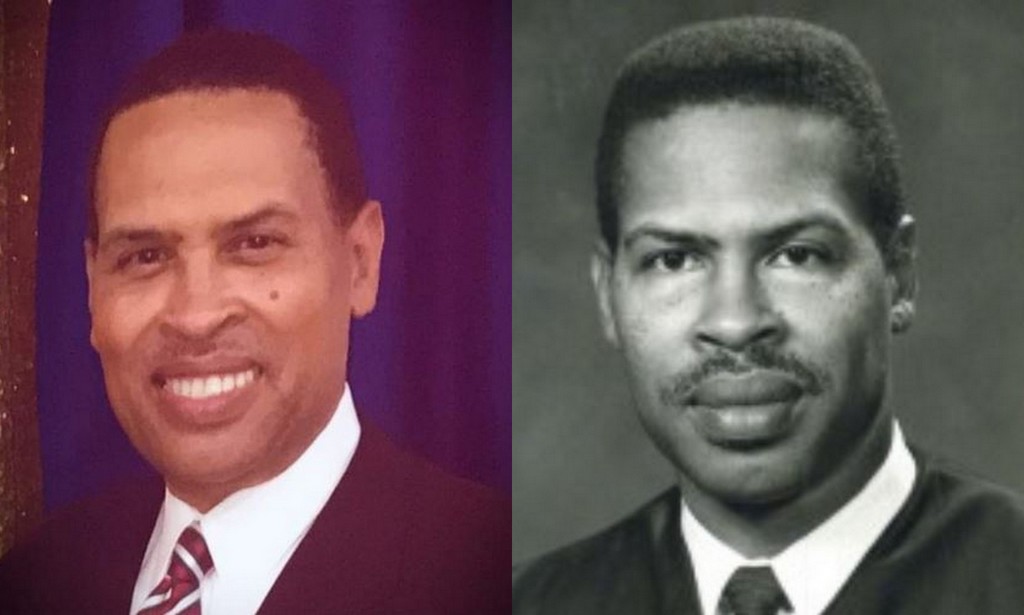[ad_1]
By Joe Gyan Jr.
The Associated Press/The Advocate
Growing up Black and poor in Baton Rouge’s poverty-stricken inner city with their nine siblings during the civil rights era, twins Don and Ron Johnson never imagined one day going to college — or better yet, putting on a judicial robe.
But when Ron Johnson was elected in November to the 19th Judicial District Court bench where Don Johnson has served since 1999, they made history, becoming the only brothers to simultaneously serve on the Baton Rouge-based 19th JDC — and the only twin brothers to serve on Louisiana district courts, according to the Law Library of Louisiana at the Louisiana Supreme Court.
The brothers also are believed to be only the second set of twins nationally to serve concurrently on a state district court. Incidentally, the other set, identical twin sisters Shera Grant and Shanta Owens, who sit on the 10th Judicial Circuit in Jefferson County, Alabama, are LSU Law Center graduates.

The Johnsons, 65, hope their story is an inspiration to others who face similar obstacles and challenges to the ones they did growing up in the Gus Young Park neighborhood.
“It’s provided something that others can see, touch. We’ve given hope to others,” Don Johnson said during a joint interview with his brother at the 19th JDC.
“I think it gives hope, strength, a new awakening to some, not to sell yourself short,” Ron Johnson added. “The dream within them can give birth to a new reality.”
Ron Johnson, who practiced law for 36 years before becoming a judge, also believes his story is one of perseverance and tenacity.
A former East Baton Rouge Parish School Board member and ex-assistant state attorney general, Ron Johnson sits on the 19th JDC’s criminal bench.
Don Johnson, a former East Baton Rouge Parish prosecutor, serves on the 19th JDC’s civil bench. He also handles traffic court, drug treatment court and the pretrial diversion and recovery court.
The Johnsons, whose parents were high school-educated, both graduated from Southern University with mechanical engineering degrees. Don Johnson eventually attended LSU Law Center, where the bar passage rate was higher, and Ron Johnson went to Southern University Law Center, closer to his home.
Don Johnson graduated from law school in 1982; Ron Johnson in 1984. Their letters from the Committee on Bar Admissions show they passed all subjects on the bar exam.
But before that, the Johnsons attended segregated public schools, such as Park Elementary and Capitol Junior High. Times were hard in the inner-city.
“We were dirt poor. We just didn’t know it,” Don Johnson said with a smile. His brother said they also had a strong spiritual upbringing.
In the late 1960s, the Johnsons volunteered to help desegregate high schools in Baton Rouge. They attended Westdale Junior High, and later enrolled at and graduated from Baton Rouge High.
“We just went to class and studied. We didn’t realize we were pioneering,” Don Johnson acknowledged.
Ron Johnson described attending all-White schools as a “cultural adjustment.”
“It prepared us to have thick skins,” his twin brother noted.
Westdale is also where the Johnsons were introduced to the idea of going to college, because everyone who graduated from Westdale was expected attend college.
“Overnight, that’s a whole difference in the culture,” Don Johnson said. “That seed is being planted that you’re going to college.”
After graduating from Southern with their engineering degrees, Don Johnson went to work for Southwestern Bell in St. Louis and Ron Johnson for General Electric in Cincinnati.
The Johnsons eventually returned to Baton Rouge and pursued their law degrees.
“I went to law school because I wanted to use the law to change conditions for people,” said Don Johnson, who explained that he and his brother had emerged from high school “having an appreciation of two worlds.”
The Johnsons credit the likes of the late Judge Ralph Tyson and retired judges Freddie Pitcher Jr. and Curtis Calloway — and those who supported them — with opening doors for the Johnsons and other persons of color to compete in elections.
The Johnsons themselves were involved in voter registration efforts during the fight to elect the city’s first African-American judges.
“That was preparing me and Ron and others to pursue the opportunities that were made available,” Don Johnson said.
Pitcher was the first African-American judge in Baton Rouge, winning election to City Court in 1983. He also was the first African-American elected to the 19th JDC in 1987, and was the state 1st Circuit Court of Appeal’s first African-American judge.
Tyson was the first African-American to serve on the federal bench in Baton Rouge. Calloway served on Baton Rouge City Court and the 19th JDC.
Looking back, Don Johnson said, he wouldn’t trade any of the experiences that have molded him and his twin brother.
“When we see injustice we don’t shy from it, we don’t talk around it,” he said. “We’re just keenly aware of that promise.”
[ad_2]
Source link
